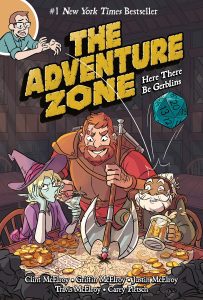How to Have Restrictive Contracts and Still Be “The Good Guys”
 Justin, Travis, and Griffin McElroy have built a podcast empire on being wholesome good guys. They come off to their fans as three brothers who are down-to-Earth, goofy, and will never do anything to hurt people. This has connected with podcast listeners worldwide, helping them build a massive fan base.
Justin, Travis, and Griffin McElroy have built a podcast empire on being wholesome good guys. They come off to their fans as three brothers who are down-to-Earth, goofy, and will never do anything to hurt people. This has connected with podcast listeners worldwide, helping them build a massive fan base.
But at some point, businesspeople and celebrities make mistakes. For the McElroys, this mistake has come in the form of them trying to find ways to make money off the success of their podcasts. Prior to 2018, the McElroys had sold merch for their podcasts, gone on tours to do live recordings of podcasts, and had a brief TV adaptation of the podcast “My Brother, My Brother and Me” on the failed streaming platform Seeso, which was owned by NBCUniversal.
Then came the graphic novel adaptation of “The Adventure Zone,” which shot to the top of the New York Times bestseller’s list. The graphic novel, while illustrated by Casey Pietsch, features a gallery of fan art at the back of every volume. Given the relationship the McElroys have with their fans, it seems reasonable they would pay tribute to the fans and the artwork they create by including a gallery of artwork tied to the events of that volume.
This fan art gallery has become the center of a bit of controversy in recent weeks.

 My grandfather recently passed away. It wasn’t Covid; not directly at least. A lifetime of kidney problems and other assorted ailments weren’t helped by the pandemic-induced lock-down. Rather than go out to eat or graze at the local grocery store buffet, as he normally would, he dined on pre-cooked meals and unsurprisingly his health suffered for it. So no, Covid didn’t kill him, but it certainly helped. In legal-speak it was more of a proximate cause.
My grandfather recently passed away. It wasn’t Covid; not directly at least. A lifetime of kidney problems and other assorted ailments weren’t helped by the pandemic-induced lock-down. Rather than go out to eat or graze at the local grocery store buffet, as he normally would, he dined on pre-cooked meals and unsurprisingly his health suffered for it. So no, Covid didn’t kill him, but it certainly helped. In legal-speak it was more of a proximate cause. When lawyers think about working with clients who have addictions, we often imagine clients who are young or middle-aged and facing legal consequences such as criminal charges for drug possession or for driving under the influence of alcohol or another drug. But not every person struggling with addictions is young, in trouble with law enforcement, or even using substances in a visible way that signals addiction to family members or professionals.
When lawyers think about working with clients who have addictions, we often imagine clients who are young or middle-aged and facing legal consequences such as criminal charges for drug possession or for driving under the influence of alcohol or another drug. But not every person struggling with addictions is young, in trouble with law enforcement, or even using substances in a visible way that signals addiction to family members or professionals.